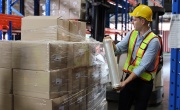Volunteers sought to help clean UK’s beaches
 The Marine Conservation Society (MCS) has asked for volunteers to join in ‘The Great British Beach Clean’, an annual weekend dedicated to picking and monitoring coastal litter.
The Marine Conservation Society (MCS) has asked for volunteers to join in ‘The Great British Beach Clean’, an annual weekend dedicated to picking and monitoring coastal litter.
MCS is a UK charity dedicated to protecting sea, shores and wildlife. It regularly organises beach cleans as part of its BeachWatch programme and has put out an ‘urgent’ call for volunteers to ‘help tackle the tide of litter washing up on british shores’.
The event, now in its 23rd year, will take place on the third weekend in September (Friday 16 to Monday 19) and is part of the International Ocean Clean-up, a larger worldwide initiative coordinated by the Ocean Conservancy, a charity focused on protecting the ocean and the communities that depend on it.
Over 6,000 volunteers took part in the UK event last year, cleaning 340 beaches and recording the largest amount of litter per kilometre in its history, a total of 3,298 items. This year the charity is being supported by the People’s Postcode Lottery, which it hopes will make this year’s event a bigger success.
Results from the 2015 International Coastal Cleanup published last week revealed that 8,193 tonnes of litter were collected during events in 93 different countries, which covered over 25,000 miles of coastline. In total nearly 800,000 people took part across the world.
During the 2015 international cleanup, the top five most commonly collected items were cigarette butts, plastic beverage bottles, food wrappers, plastic bottle caps and plastic straws, respectively.

Fight against plastic pollution should start on beaches
The MCS says that it is ‘crucial’ that something is done to tackle coastal litter to protect marine wildlife from the risks of ingesting it or getting tangled up in marine plastic pollution.
Eunomia Research & Consulting believes the fight against plastic in our oceans should start on beaches, according to research presented by the consultancy presented last week.
The company’s research revealed that only around one per cent of the total plastic in the ocean is found floating on the surface with the vast majority ending up on the sea floor at a concentration of around 70 kilogrammes (kg) in every square kilometre (km2).
Plastic is more concentrated on beaches where levels reach around 2,000 kg/km2. Therefore Eunomia believes initiatives designed to retrieve plastic from beaches would be ‘more effective’ than those that remove plastic from the surface water.
The research also showed that over 80 per cent of the 12.2 million tonnes of plastic entering the ocean every year comes from land based sources. It is also estimated that around 0.95 million tonnes of the total plastic in the ocean is in the form of microplastics.
Eunomia suggest that a levy, like that imposed on single use carrier bags, should be charged on disposable packaging such as disposable cutlery and take away cups. The plastic bag charge has led to a huge reduction in the amount of bags used, it is possible such a levy would have the same effect on disposable packaging.
 Photo: Marine Conservation Society
‘Huge hike’ in beach litter
Photo: Marine Conservation Society
‘Huge hike’ in beach litter

Lauren Eyles, MCS Beachwatch Manager, said: “Over the last decade, we’ve recorded a huge hike in the amount of litter found on our beaches – up by over 65 per cent. We need help – and anyone can simply volunteer to take part.”
Clara Govier, Head of Charities at People’s Postcode Lottery, added: “It’s really important for everyone to learn about the dangers of marine litter and I’m delighted that players of People’s Postcode Lottery are supporting the Marine Conservation Society who are tackling this important cause. I would urge anyone who has the time to spare to take part in this beach clean.”
More information on the Great British Beach Clean 2016 can be found on the Marine Conservation Society’s website.




